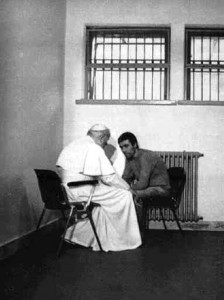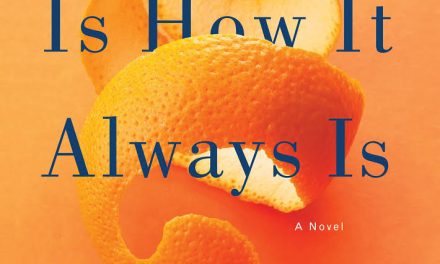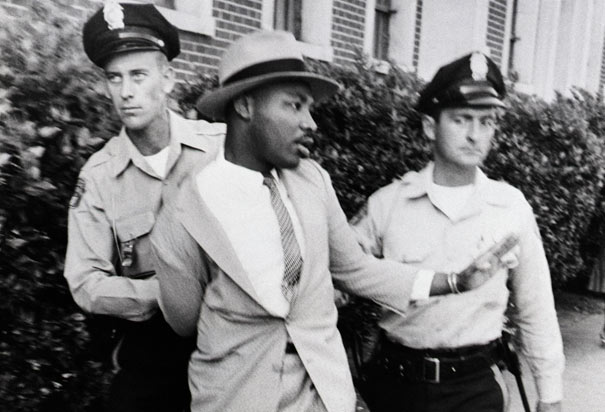A poignant image of Blessed John Paul II has surfaced a great deal in recent months – first in response to his beatification and then in reflections on the death of Osama Bin Laden and questioning the appropriate Christian responses — John Paul II meeting with and forgiving the man who tried to kill him.
Around the beatification of John Paul II, James Martin, SJ at America Magazine‘s Blog highlighted that John Paul II’s response to his would-be assassin as a sign of personal sanctity:
And, in my eyes, anyone who visits the prison cell of his would-be assassin and forgives the man is a saint
Forgiveness is at the heart of Christian discipleship. Deeper understandings of the call and need for forgiveness are at the heart of current moves for Restorative Justice and Reconciliation (such as Apartheid in South Africa). In a famous interview with Bill Moyers, Ret. Archbishop Desmond Tutu frames the Christian theology of forgiveness as necessary for the healing of both victim and perpetrator. We all need forgiveness. In addition, for the Christian – there is nothing that is UNFORGIVABLE. ( Desmond Tutu on Apartheid, Perpetrators, Forgiveness )
However, as we have seen in the reactions to Osama Bin Laden’s death – forgiveness is often a difficult struggle; and in many cases, we fail to live up to the call “forgive those who trespass against us.” And an emphasis on forgiveness is not unique to Christianity — forgiveness is a central theme to all the major world religions.
With the image of both John Paul II and with the reactions to Bin Laden’s death in mind – I found the NPR segment on the 9/11 Hate Crime Victim’s forgiveness of his attacker providing a profound, beautiful, and challenging lesson on forgiveness.
Just 10 days after the attacks of Sept. 11, 2001, Rais Bhuiyan was working at a gas station in Dallas when he was shot in the face by a man named Mark Stroman.
Stroman was on a shooting spree, targeting people who appeared to be Muslim or of Middle Eastern descent. Stroman is due to be executed July 20; Bhuiyan, the only survivor of the attacks, is fighting to save his life.
What Bhuiyan thought was a routine robbery was in fact a racially and religiously motivated hate crime. In the wake of the attack, Bhuiyan suffered damage to his eye, multiple surgeries, and family tragedies.
Despite the difficulties, Bhuiyan looked to his faith in order to find forgiveness.
“According to my faith in Islam, there is no hate, no killing. It doesn’t allow anything like that,” says Bhuiyan. “Yes, Mark Stroman did a horrible thing, and he brought a lot of pain and disaster, sufferings in my life. But in return I never hated him.”
Bhuiyan has created a website called World Without Hate to educate others about hate crimes as a means of preventing them. He’s also working with Amnesty International and Stroman’s defense attorney, who has filed several appeals on Stroman’s death sentence.
“I strongly believe executing him is not a solution. We will just simply lose a human life without dealing with the root cause, which is hate crime,” Bhuiyan says. “In Islam it says that saving one human life is the same as saving the entire mankind. Since I forgave him, all those principles encouraged me to go even further, and stop his execution and save another human life.”
Bhuiyan offers all of us a stunning example of human dignity and the grace to see beyond revenge/retribution. Would we be able to forgive our attacker? To stand up against his execution? This is the challenge both John Paul II and Bhuiyan pose to all of us – as human beings and particularly as Christians – because it is clear that forgiveness like this is that to which we are called.





Amazing picture…I want one framed and on my wall! Incidentally, PBS recently did a documentary on forgiveness that was awesome. Think its online and/or dvd now. http://www.pbs.org/programs/forgiveness/